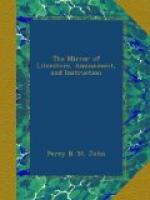A council of war, composed of French marshals, was appointed to try him; but they had little inclination to pass sentence on an old companion in arms; and declared their incompetency to try one, who, when he consummated his treason, was a peer of France. Accordingly, by a royal ordinance of November 12th, the Chamber of Peers were directed to take cognizance of the affair. His defence was made to rest by his advocates—first, on the twelfth article of the capitulation, and when this was overruled, on the ground of his no longer being amenable to French laws, since Sarre-Louis, his native town, had recently been dissevered from France. This the prisoner himself overruled; “I am a Frenchman, (cried Ney), and I will die a Frenchman!” The result was that he was found guilty and condemned to death by an immense majority, one hundred and sixty-nine to seventeen. On hearing the sentence read according to usage, he interrupted the enumeration of his titles, by saying: “Why cannot you simply call me Michael Ney—now a French soldier, and soon a heap of dust?” His last interview with his lady, who was sincerely attached to him, and with his children, whom he passionately loved, was far more bitter than the punishment he was about to undergo. This heavy trial being over, he was perfectly calm, and spoke of his approaching fate with the utmost unconcern. “Marshal,” said one of his sentinels, a poor grenadier, “you should now think of God. I never faced danger without such preparation.” “Do you suppose (answered Ney) that any one need teach me to die?” But he immediately gave way to better thoughts, and added, “Comrade, you are right. I will die as becomes a man of honour and a Christian. Send for the curate of St. Sulpice.”
A little after eight o’clock on the morning of December 7th, the marshal, with a firm step and an air of perfect indifference, descended the steps leading to the court of the Luxembourg, and entered a carriage which conveyed him to the place of execution, outside the garden gates. He alighted, and advanced towards the file of soldiers drawn up to despatch him. To an officer, who proposed to blindfold him, he replied—“Are you ignorant that, for twenty-five years, I have been accustomed to face both ball and bullet?” He took off his hat, raised it above his head, and cried aloud—“I declare before God and man that I have never betrayed my country: may my death render her happy! Vive la France!” He then turned to the men, and, striking his other hand on his heart, gave the word, “Soldiers—fire!”
Thus, in his forty-seventh year, did the “Bravest of the Brave” expiate one great error, alien from his natural character, and unworthy of the general course of his life. If he was sometimes a stern, he was never an implacable, enemy. Ney was sincere, honest, blunt even: so far from flattering, he often contradicted him on whose nod his fortunes depended. He was, with rare exceptions, merciful to the vanquished; and while so many of his brother marshals dishonoured themselves by the most barefaced rapine and extortion, he lived and died poor.




